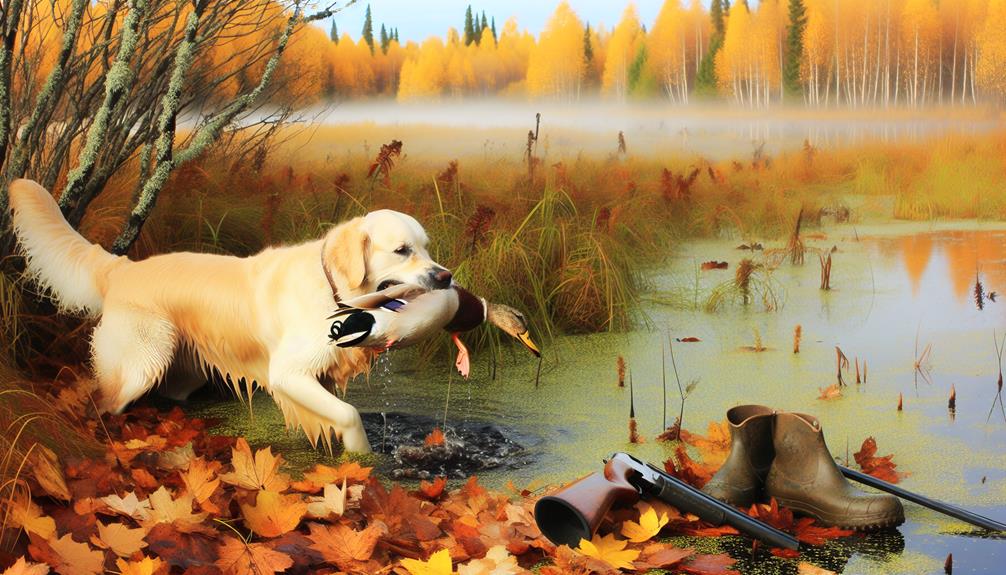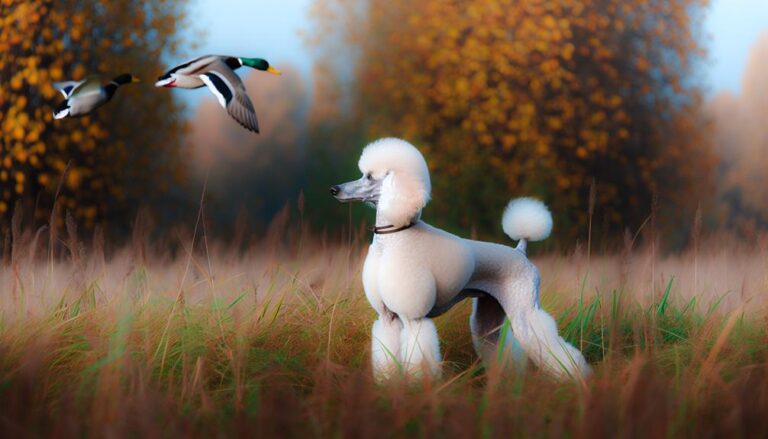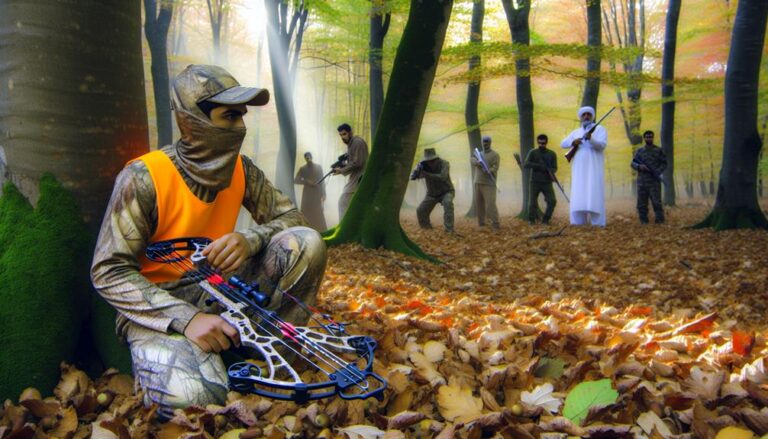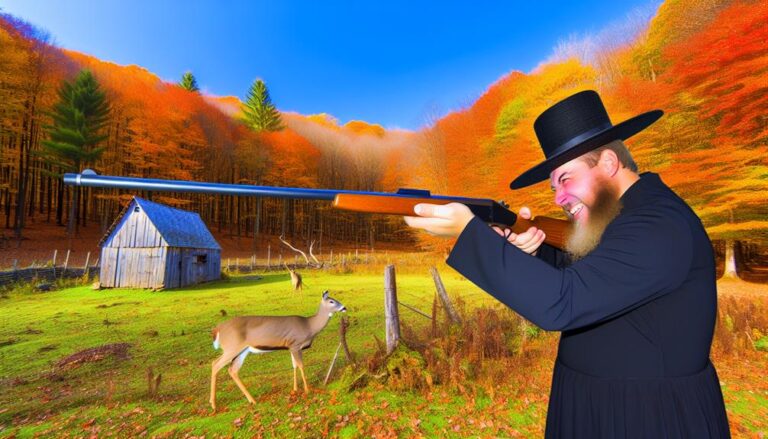Are Golden Retrievers Good Hunting Dogs
Golden Retrievers are excellent hunting dogs. Their heritage as retrievers for game birds has equipped them with exceptional abilities for fieldwork. They possess a keen sense of smell, high energy levels, and impressive stamina, making them versatile across diverse terrains and weather conditions. These intelligent dogs excel in retrieving, flushing, and tracking game. Their gentle disposition and enthusiasm to please make them ideal for both novice and experienced hunters. With proper training and care, Golden Retrievers can seamlessly shift from the hunting field to family companionship. Understanding the differences between field-bred and show-bred lines can help you choose the best Golden for your hunting needs.
Golden Retriever Hunting Heritage
Golden Retrievers' roots run deep in the hunting world, stretching back over two centuries to their origins in England and Scotland. These dogs were specifically bred for hunting purposes, with a focus on retrieving game birds both on land and in water. The breed's development centered around creating a dog that could excel in the field while maintaining a gentle and friendly disposition.
The hunting heritage of Golden Retrievers is evident in their natural abilities to track, retrieve, and please their owners. These traits make them excellent companions for hunters, combining their innate instincts with a willingness to work closely with their human partners. Field bred Goldens, in particular, often exhibit stronger hunting drives and may be better suited for active hunting roles.
The breed standard for Golden Retrievers emphasizes the importance of preserving their hunting traits and abilities. This guarantees that even as the breed has gained popularity as a family pet, its core hunting characteristics remain intact.
When you're considering a Golden Retriever for hunting, you'll find a dog with a rich heritage and natural aptitude for the sport, making them a reliable choice for hunters of various skill levels.
Breed Characteristics for Hunting
When you're considering a Golden Retriever for hunting, you'll appreciate their exceptional sense of smell. This breed's keen nose makes them excellent at tracking down game during hunting expeditions.
You'll also benefit from their high energy levels and impressive stamina, which allow them to keep up with you on long hunting trips without tiring easily.
Strong Sense of Smell
An exceptionally keen sense of smell sets these dogs apart as exceptional hunting companions, allowing them to track and locate game birds with remarkable precision. Golden Retrievers possess one of the strongest olfactory abilities among dog breeds, making them invaluable assets in the field. Their powerful noses enable them to detect scents over long distances, even in challenging terrain and weather conditions.
When you're out hunting with a Golden Retriever, you'll find that their scent-tracking skills are pivotal for success. These dogs can follow the trail of birds that have been shot, helping you locate and retrieve game that might otherwise be lost. Their ability to pick up on subtle scents in the air or on the ground is truly impressive, often surpassing human detection capabilities.
The Golden Retriever's strong sense of smell isn't just useful for finding live birds; it's equally valuable for locating downed game. This skill is particularly important in dense vegetation or water, where visual spotting can be difficult. By relying on their noses, these dogs can efficiently guide you to your quarry, saving time and effort during your hunting expeditions.
Energy and Stamina
Why do hunters value Golden Retrievers? It's their impressive energy and stamina that sets them apart in the field. These dogs are built for endurance, making them excellent companions for long hunting expeditions. Their high energy levels allow them to work tirelessly, retrieving game for hours without quickly getting fatigued.
When you're considering Golden Retrievers for hunting, their stamina is a vital factor. They can sustain physical activity for extended periods, which is essential during field trials and actual hunts. This endurance means they can cover more ground and retrieve more game throughout the day. To harness their full potential, it's important to build their stamina through regular exercise and training.
Their energetic nature isn't just about physical capability; it also contributes to their enthusiasm for the task at hand. Golden Retrievers are keen to please and love having a job to do. This combination of physical stamina and mental drive makes them well-suited for various hunting scenarios.
Whether you're duck hunting in marshes or retrieving upland game, a well-trained Golden Retriever can keep up with the demands of the hunt, making them good hunting dogs for many sportsmen.
Training Golden Retrievers for Fieldwork
Training Golden Retrievers for fieldwork requires a strategic approach that harnesses their natural talents and builds essential hunting skills. These intelligent and enthusiastic-to-please dogs excel in field trials, thanks to their strong retrieval instincts.
To prepare your Golden for fieldwork, focus on obedience training, retrieving skills, and exposure to hunting environments.
Begin with consistent daily training sessions of at least fifteen minutes. Gradually introduce hunting concepts and use positive reinforcement to encourage desired behaviors. Obedience training forms the foundation, ensuring your dog responds to commands in various situations.
Next, develop retrieving skills through repetitive exercises, starting with simple fetch games and progressing to more complex retrieval scenarios.
Expose your Golden to different terrains and hunting environments to build confidence and adaptability. Proper socialization is essential, as it helps your dog remain calm around other animals and gunfire.
Work on building your dog's stamina through regular exercise and longer training sessions.
Remember that patience and consistency are key when training Golden Retrievers for fieldwork. With dedication and the right approach, you can develop a skilled hunting companion that excels in retrieving game and working alongside you in the field.
Essential Hunting Equipment
Once your Golden Retriever has mastered the basics of fieldwork, you'll need to equip yourself and your canine companion with the right gear for a successful hunt. Essential hunting equipment for golden retrievers includes a shotgun, hunting vest, dog vest, dog bed, dog bowl, hunting license, and a first-aid kit. These items ensure both you and your dog are prepared for the challenges of the hunt.
Your hunting vest is vital for protection and provides a convenient way to attach your dog's leash during hunting activities. For your Golden Retriever, a dog vest offers similar benefits, keeping them safe and visible in the field.
Don't forget to pack dog treats, as they're important for positive reinforcement during training and hunting.
Training with the proper equipment guarantees safety, comfort, and effectiveness in the field. A dog bed and bowl are necessary for your retriever's rest and nourishment during extended hunting trips. Remember to always carry a first-aid kit in case of emergencies.
Hunting Environments and Adaptability
Golden Retrievers consistently demonstrate their remarkable flexibility across diverse hunting environments, making them invaluable companions for various types of game pursuits. These versatile hunting dogs excel in fields, marshes, and forests, smoothly shifting between different terrains.
You'll find that Golden Retrievers can navigate open spaces and dense cover with equal ease, showcasing their ability to adjust to changing landscapes.
When you're hunting game birds, you'll appreciate your Golden Retriever's proficiency in retrieving across various environments. Their natural instincts and training enable them to perform effectively in upland fields and waterfowl marshes alike. This flexibility means you can rely on your Golden Retriever regardless of the hunting conditions you encounter.
The breed's ability to handle different weather conditions further enhances their value as hunting companions. Whether you're dealing with wet marshes or dry fields, your Golden Retriever will remain focused on the task at hand.
Their flexibility in diverse hunting environments ensures that you'll have a dependable partner by your side, capable of meeting the challenges of various hunting situations with confidence and skill.
Health Considerations for Hunting Dogs
When considering Golden Retrievers for hunting, you'll need to prioritize their well-being to guarantee they can perform at their best in the field. Responsible breeders focus on genetic testing to prevent health issues that could impact a dog's hunting abilities. Field-bred Golden Retrievers are specifically bred for athleticism and health, making them well-suited for hunting activities.
Here are some key health considerations for hunting dogs:
- Genetic health clearances
- Regular veterinary check-ups
- Proper nutrition for active dogs
- Adequate exercise and conditioning
By prioritizing these health considerations, you'll ensure your Golden Retriever is prepared for hunting tasks.
Unchecked breeding practices can lead to genetic problems that affect a dog's performance and overall well-being. That's why it's important to work with reputable breeders who emphasize health and athleticism in their breeding programs.
When selecting a Golden Retriever for hunting, look for dogs from lines that have been bred specifically for field work. These dogs are more likely to have the health and physical attributes needed to excel in hunting environments.
Comparing Goldens to Other Breeds
When comparing Golden Retrievers to other hunting breeds, you'll find that each dog has its own unique strengths.
You'll want to take into account factors like breed-specific hunting abilities, versatility versus specialization, and ease of training.
Breed-Specific Hunting Strengths
Comparing Golden Retrievers to other hunting breeds reveals their unique strengths in the field. Originally bred as hunting dogs, Goldens possess exceptional qualities that make them stand out:
- Strong sense of smell for tracking game birds
- High intelligence and trainability
- Enthusiasm to please their handlers
- Forgiving nature, ideal for new hunters
You'll find that Golden Retrievers excel in various hunting tasks due to their natural instincts and physical attributes. Their keen sense of smell allows them to track game birds efficiently, while their intelligence makes them highly trainable for complex hunting commands. Unlike some other breeds, Goldens are particularly forgiving, making them perfect companions for inexperienced hunters who may make mistakes in the field.
However, it's worth noting that Golden Retrievers may take longer to settle down compared to other hunting breeds. This characteristic can be both an advantage and a challenge, depending on your hunting style and preferences. When considering a Golden Retriever as your hunting companion, weigh these breed-specific strengths against your personal needs and hunting goals to make an informed decision.
Versatility Vs. Specialization
Versatility sets Golden Retrievers apart from specialized hunting breeds, making them adaptable companions for various hunting scenarios. Unlike breeds that excel in specific roles, such as pointers or setters, Golden Retrievers offer a well-rounded skill set that allows them to shift between different hunting tasks. This adaptability makes them valuable for hunters who engage in multiple types of hunting or prefer a dog that can handle diverse situations.
When comparing Golden Retrievers to specialized hunting breeds, you'll find that they're capable of flushing, retrieving, and tracking game. While they may not match the expertise of a breed focused on a single task, their versatility compensates for this. Golden Retrievers can be good hunting partners across different terrains and game types, adapting to your needs as a hunter.
Another advantage of Golden Retrievers is their dual role as hunting dogs and family companions. Their gentle and friendly demeanor allows them to seamlessly shift from the field to the home. This makes them an excellent choice if you're looking for a dog that can both hunt effectively and be a good family pet.
Training Ease Comparison
Trainability stands out as a key advantage for Golden Retrievers when you're considering various hunting dog breeds. These intelligent and enthusiastic-to-please dogs are often easier to train compared to other hunting breeds. You'll find that their adaptability and gentle nature make them more forgiving of training mistakes, which is especially beneficial if you're new to training hunting dogs.
Here are some key points about Golden Retrievers' training ease:
- They excel in learning commands quickly
- Their high intelligence aids in grasping complex tasks
- Their enthusiasm to please enhances training efficiency
- They're adaptable to various training methods
When comparing Golden Retrievers to other hunting dogs, you'll notice that some breeds may require more specialized training techniques or have a higher prey drive. This can make training more challenging for inexperienced handlers. Golden Retrievers, on the other hand, offer a balance of trainability and versatility that makes them an excellent choice for hunters of all skill levels.
Their ability to excel in various hunting scenarios, combined with their training ease, makes Golden Retrievers a popular and practical choice for those seeking a reliable hunting companion.
Field-Bred Vs. Show-Bred Goldens
When opting for a Golden Retriever for hunting, one must take into account significant differences between field-bred and show-bred lines. Field-bred Goldens are specifically bred for their hunting abilities and excel in field work. These dogs typically exhibit higher energy levels, stronger prey drive, and better hunting instincts. They're the preferred choice for hunters due to their working abilities and compatibility in hunting environments.
On the other hand, show-bred Goldens are bred with physical traits prioritized for conformation shows rather than hunting skills. While they may possess the breed's characteristic friendly temperament, they often lack the drive and stamina required for intensive hunting tasks. Show-bred Goldens might struggle with the demands of long hunting days or challenging terrain.
If you're serious about hunting with your Golden Retriever, you'll want to take into consideration a field-bred line. These dogs are more likely to have the natural instincts and physical capabilities needed for hunting activities. They're generally easier to train for hunting tasks and will have the endurance to keep up with you in the field. However, it's crucial to bear in mind that individual dogs may vary, so assess each potential puppy's temperament and energy level before making your decision.
Challenges in Hunting With Goldens
When hunting with Golden Retrievers, you'll face challenges related to their adaptability to different weather conditions and terrains.
You may need to take extra precautions in cold water environments, as their shorter coats can make them more susceptible to the cold.
Additionally, you'll have to manage their high prey drive and enthusiasm, which can sometimes distract them from the task at hand.
Weather and Terrain Adaptability
Despite their versatility, Golden Retrievers face unique challenges when adapting to diverse weather conditions and terrains during hunting expeditions. Their thick, water-repellent coat provides insulation in cold and wet environments, but it can also lead to overheating in warmer climates. You'll need to monitor your Golden's temperature and provide adequate rest and hydration during hunts.
Golden Retrievers excel in water-based hunting activities, but some may take longer to acclimate to cold water. To prepare your dog for various conditions, consider:
- Gradual exposure to different terrains
- Regular swimming practice in various water temperatures
- Conditioning exercises to build endurance
- Proper grooming to maintain their protective coat
Your Golden's adaptability to different environments makes them valuable hunting companions. They can navigate through heavy cover and rough terrain with agility and stamina. However, you'll need to be patient when introducing them to new hunting conditions.
Start with short outings and gradually increase the duration and difficulty of hunts. This approach will help your Golden Retriever build confidence and develop the skills needed to tackle diverse weather and terrain challenges during hunting expeditions.
Prey Drive Management
Along with their many hunting strengths, Golden Retrievers' powerful prey drive can pose significant challenges for hunters seeking to maintain control during expeditions.
You'll need to implement effective prey drive management strategies to harness this instinct and channel it towards your hunting objectives.
To start, it's essential to understand your Golden's natural instincts. This breed's strong desire to chase and retrieve can be both an asset and a hurdle in hunting situations.
To address this, you'll want to focus on consistent training techniques that reinforce desired behaviors. Positive reinforcement methods work well with Goldens, helping you guide their prey drive in productive directions.
Socialization plays a key role in prey drive management. Expose your dog to various hunting environments early on, allowing them to become accustomed to different stimuli. This exposure helps regulate their reactions to wildlife during actual hunts.
Building a Bond Through Hunting
Through hunting activities, you'll forge a deeper connection with your golden retriever, strengthening your bond in ways that go beyond everyday interactions. As hunting dogs, golden retrievers thrive on the teamwork and communication required in the field. You'll find that working together towards a common goal enhances your relationship and deepens the trust between you and your canine companion.
The shared experiences in hunting create lasting memories and a special bond. Here are some ways hunting can strengthen your connection:
- Improved communication through verbal and non-verbal cues
- Enhanced trust as you rely on each other's skills
- Shared excitement and success in achieving goals
- Increased quality time spent together outdoors
Training for hunting activities also provides an opportunity to deepen your connection. As you work on skills like retrieving, scent detection, and obedience, you'll develop a stronger understanding of your dog's capabilities. This mutual growth fosters a sense of accomplishment and pride in your partnership.






